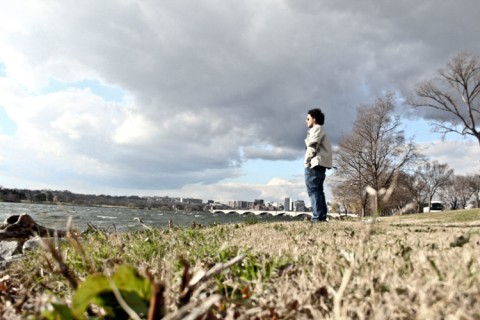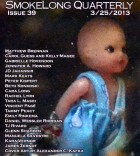1. Though its namesake is rain, it doesn’t reveal itself until after October. Then, it rains, a lot. But during September, the month I was supposedly born, the weatherman said that, though it would be gray and menacing, the rain wouldn’t “happen” until Thursday this week. And I had trusted him, his voice, his way of predicting celestial fickleness. As I walked to work on Tuesday, wondering how I came to be teaching elementary school children about parts of speech, it rained, hard, then, as if it wanted to surprise me, show its capriciousness, stopped once I reached the school’s large glass door. Hair matted down from the wetness, another teacher opened the door, looked, and said to me, “Where’s your umbrella?” “The weatherman said it wouldn’t rain until Thursday.” She responded, “Silly boy. Always bring your umbrella.” Lesson one: always bring your umbrella. Assumption: you have an umbrella.
2. The coffee is clearly better here, I think. It doesn’t matter when I drink coffee anymore. Sometimes after I drink, I fall asleep, as if I drink to fall asleep. And when I dream, I dream I have three cats, three brand new cats. I’ve always been a dog person, so I don’t know what the dream means. And it bothers me that I’d have so many cats. But now, after a few months I can’t sleep. So I drink more and think of those three cats, their names, their personalities. I run on the apartment’s treadmill at two in the morning and come up with names like Larry, Lewis, Leopold, all names that reflect where I was raised. Lesson two: adjusting to the time difference will take longer than expected. Lesson two point five: get a cat, maybe two because the apartment doesn’t allow dogs.
3. “Sure,” I say to my mother, who happened to forget about the three-hour time difference. But, I’m awake, the insomnia. I boil water to run the French Press. Does it really make a difference if it’s 3:30am here, 6:30am on the east coast when your mother calls? “How’s my favorite son doing?” she asks. “I’m your only son,” I say. “You didn’t answer the question,” she says. Lesson three: you can’t hide from your mother, even on the west coast.
4. Mom calls again, early. “Did you check the top cabinet?” I say, looking out my window. I hear the cabinet door ease open, then close shut. “Thank you,” she says. “I don’t know what I’d do without you.” “You seem to be doing okay,” I say. “Did you make a decision,” she says. “Are you going to meet her? Oh, I almost forgot,” she adds. “Your cousin, Laura, she’s pregnant.” Lesson four: be born or adopted in to a family with siblings. Lesson four point five: get mom a hobby, maybe a cat. Lesson four point seven five: when you’re adopted, both mothers will find you.
5. At the school where I teach English, Fiona, asks me why I talk funny. She has a large mole near her bottom lip, with hair pulled back in pig-tails, and the kind of earnest expression synonymous with first graders’ and their questions. “Funny,” I repeat, looking at her, unsure if I can really hear what she hears. “Fiona,” I say, about to talk about regional dialects before I realize I don’t know how to explain that to a first grader. Lesson five: stop talking funny. Also: no more stickers for Fiona.
6. I name my cats Lewis and Clark. The irony is that they’re indoor cats, and I live in a studio. When they follow me around, I pretend that I’m the Columbia River, so I snake around the apartment with them in tow. Sometimes I create an obstacle for them, and say, “This won’t be easy; traversing and marking new lands—it’s never easy.” But they just rub against my leg, wait for me to bend down and pet them. Lesson six: get a hobby and/or get out more.
7. At Canyon Beach on an unclear day, Tillamook lighthouse reminds me of one of my favorite paintings, Wanderer above the Sea of Fog. It’s been six months since I was laid off and moved to the west from the east coast, away from family and friends, away from familiarity, away from the letter that had arrived telling me that she was looking for me. And I think, as my shoes make subtle impressions on the firm and sooty looking sand, as the strong wind fills my shoes with imperceptible pieces, I think all we needed was to keep pretending that we didn’t exist, that we didn’t need each other, that it was okay, that we forgave each other, that that sometimes happens in life. But when that letter came, the distance—the penumbra like past—became a momentary lapse, merely a delay between the things we had meant to say and the things some of us hoped to say. And I hear it in my head when I imagine and hope that she will say, “I’m sorry, I’m sorry, I’m sorry.” Lesson seven: There are unforeseen consequences to everyone’s actions.



 In its third year, The March Micro Marathon will be, as usual, a prompt-a-day whirlwind for 24 days. You’ll exchange drafts of micro fiction, non-fiction, and prose poetry in small groups and gather for a series of online events (all recorded for participants unable to attend live). We’ll finish with 3 competitions, and participants who are not already in SmokeLong Fitness will be invited to workshop with SmokeLong Fitness until the end of April!
In its third year, The March Micro Marathon will be, as usual, a prompt-a-day whirlwind for 24 days. You’ll exchange drafts of micro fiction, non-fiction, and prose poetry in small groups and gather for a series of online events (all recorded for participants unable to attend live). We’ll finish with 3 competitions, and participants who are not already in SmokeLong Fitness will be invited to workshop with SmokeLong Fitness until the end of April!